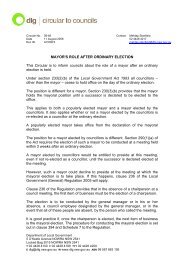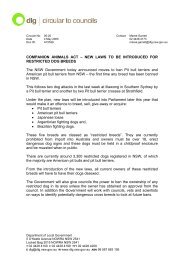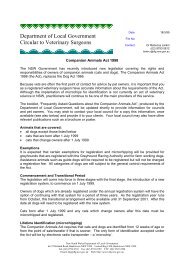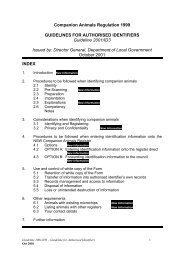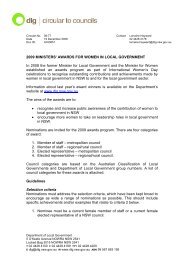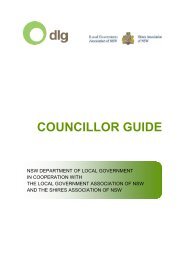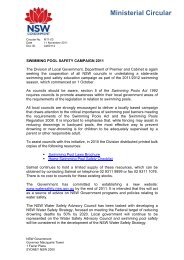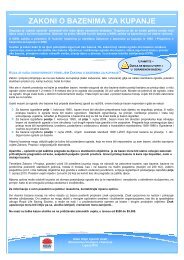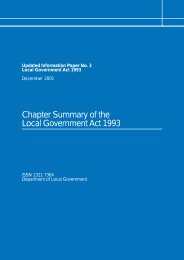Integrated Planning and Reporting Manual - Division of Local ...
Integrated Planning and Reporting Manual - Division of Local ...
Integrated Planning and Reporting Manual - Division of Local ...
You also want an ePaper? Increase the reach of your titles
YUMPU automatically turns print PDFs into web optimized ePapers that Google loves.
5. THE OPERATIONAL PLAN<br />
5.3 Measuring progress<br />
<strong>Local</strong> Government Regulation<br />
The responsible accounting <strong>of</strong>ficer <strong>of</strong> council must report quarterly (except the June quarter) to council<br />
on the budget in the Operational Plan.<br />
Essential Element 3.15<br />
The Operational Plan must identify suitable methods to determine the effectiveness <strong>of</strong> the activities<br />
undertaken.<br />
As discussed in Section 4-Delivery Program, it is important to develop some form <strong>of</strong> assessment<br />
system for the Delivery Program <strong>and</strong> Operational Plan. The Delivery Program assessment system<br />
will mainly focus on outcomes – did the actions have the desired effect<br />
At the Operational Plan level, the main focus will be on outputs because this Plan will involve<br />
multiple activities within the space <strong>of</strong> one year, which may only go part <strong>of</strong> the way to achieving<br />
higher level strategies <strong>and</strong> objectives. Therefore, it may be difficult to assess the achievement <strong>of</strong><br />
outcomes at this level.<br />
The achievenment <strong>of</strong> outcomes will be assessed over the four years <strong>of</strong> the Delivery Program. The<br />
sum <strong>of</strong> all the actions undertaken should move Council towards achieving its objectives.<br />
Some councils prefer to combine targets <strong>and</strong> measures at Operational Plan level. For example, the<br />
measure might be to complete a certain task, the target might be to complete the task by a certain<br />
date. This combination allows Council to ascertain not only whether it delivered what it said it would<br />
do, but also whether it delivered it to the timeframes, costing <strong>and</strong> quality st<strong>and</strong>ards it expected.<br />
Each council will make its own judgements on how detailed its measures or targets should be. The<br />
minimum expectation is that some form <strong>of</strong> assessment exists. Measurement Example 1 on the next<br />
page shows measures <strong>and</strong> targets from one metropolitan council’s annual plan.<br />
Other councils prefer to use a system <strong>of</strong> key performance indicators to determine if they are carrying<br />
out their annual activities within the cost range <strong>and</strong> quality st<strong>and</strong>ards required. An example <strong>of</strong> key<br />
performance indicators from a regional council’s annual operational plan follows as Measurement<br />
Example 2.<br />
Councils who use either <strong>of</strong> these measurement systems will find it easier to measure progress <strong>and</strong><br />
report to Council. The minimum st<strong>and</strong>ard required is quarterly exception reporting (except the June<br />
quarter) on the budget in the Operational Plan. Councils may choose to report on the status <strong>of</strong><br />
projects <strong>and</strong> activities that are not running to time, quality or budget.<br />
Councils can, if they wish, adopt a more detailed form <strong>of</strong> reporting. However, they should carefully<br />
consider the benefits to be achieved by this <strong>and</strong> the resources required to compile the reports.<br />
<strong>Planning</strong> & <strong>Reporting</strong> <strong>Manual</strong> Page 103 <strong>of</strong> 115




